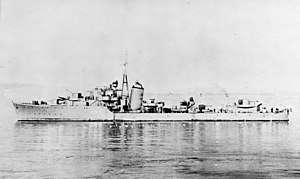HNLMS Van Galen (G84)
HNLMS Van Galen was a N-class destroyer built for the Royal Navy during the Second World War and transferred to the Royal Netherlands Navy shortly after completion. The Dutch changed the pennant numbers several times G-84 (WW II), J-3, JT-3, and D-803.[1]
 Van Galen, 1942 | |
| History | |
|---|---|
| Name: | Noble |
| Builder: | William Denny and Brothers, Dumbarton |
| Laid down: | 10 July 1939 |
| Launched: | 17 April 1941 |
| Completed: | 20 February 1942 |
| Identification: | Pennant number: G84 |
| Notes: | Transferred to Royal Netherlands Navy before completion |
| Name: | Van Galen |
| Namesake: | Johan van Galen |
| Completed: | 20 February 1942 |
| Stricken: | October 1956 |
| Fate: | Sold for scrap, 1957 |
| General characteristics (as built) | |
| Class and type: | N-class destroyer |
| Displacement: |
|
| Length: | 356 ft 6 in (108.7 m) (o/a) |
| Beam: | 35 ft 9 in (10.9 m) |
| Draught: | 12 ft 6 in (3.8 m) |
| Installed power: |
|
| Propulsion: | 2 Shafts; 2 steam turbines |
| Speed: | 36 knots (67 km/h; 41 mph) |
| Range: | 5,500 nmi (10,200 km; 6,300 mi) at 15 knots (28 km/h; 17 mph) |
| Complement: | 183 |
| Sensors and processing systems: |
|
| Armament: |
|
Description
The N-class destroyers were repeats of the J-class, except that they incorporated the wartime modifications made to the earlier ships. They displaced 1,773 long tons (1,801 t) at standard load and 2,384 long tons (2,422 t) at deep load. The ships had an overall length of 339 feet 6 inches (103.5 m), a beam of 35 feet 9 inches (10.9 m) and a deep draught of 12 feet 6 inches (3.8 m). They were powered by Parsons geared steam turbines, each driving one propeller shaft, using steam provided by two Admiralty three-drum boilers. The turbines developed a total of 40,000 shaft horsepower (30,000 kW) and gave a maximum speed of 36 knots (67 km/h; 41 mph). The ships carried a maximum of 491 long tons (499 t) of fuel oil that gave them a range of 5,500 nautical miles (10,200 km; 6,300 mi) at 15 knots (28 km/h; 17 mph). The ship's complement was 183 officers and men.[2]
The ships were armed with six 4.7-inch (120 mm) Mark XII guns in twin mounts, two superfiring in front of the bridge and one aft of the superstructure. The aft torpedo tubes were replaced by a single QF 4-inch Mk V anti-aircraft gun. Their light anti-aircraft suite was composed of one quadruple mount for 2-pounder "pom-pom" guns, four single Oerlikon 20 mm cannon and two twin mounts for the 0.5 inch Vickers Mark III anti-aircraft machinegun. The N-class ships were fitted with one above-water quintuple mount for 21-inch (533 mm) torpedoes.[3] The ship was fitted with two depth charge throwers and one rack for 45 depth charges.[2]
Construction and career
Van Galen was built as the British destroyer HMS Noble (G84), but was commissioned into the Royal Netherlands Navy shortly after completion. The ship served throughout the Second World War and was stricken in October 1956 and scrapped in February 1957 in the Netherlands.
Notes
- http://www.netherlandsnavy.nl/Nclass.htm
- Lenton, p. 170
- Whitley, p. 117
References
- Colledge, J. J.; Warlow, Ben (2006) [1969]. Ships of the Royal Navy: The Complete Record of all Fighting Ships of the Royal Navy (Rev. ed.). London: Chatham Publishing. ISBN 978-1-86176-281-8.
- English, John (2001). Afridi to Nizam: British Fleet Destroyers 1937–43. Gravesend, Kent: World Ship Society. ISBN 0-905617-64-9.
- Friedman, Norman (2006). British Destroyers & Frigates: The Second World War and After. Annapolis, Maryland: Naval Institute Press. ISBN 1-86176-137-6.
- Hodges, Peter; Friedman, Norman (1979). Destroyer Weapons of World War 2. Greenwich: Conway Maritime Press. ISBN 978-0-85177-137-3.
- Langtree, Charles (2002). The Kelly's: British J, K, and N Class Destroyers of World War II. Annapolis, Maryland: Naval Institute Press. ISBN 1-55750-422-9.
- Lenton, H. T. (1998). British & Empire Warships of the Second World War. Annapolis, Maryland: Naval Institute Press. ISBN 1-55750-048-7.
- March, Edgar J. (1966). British Destroyers: A History of Development, 1892–1953; Drawn by Admiralty Permission From Official Records & Returns, Ships' Covers & Building Plans. London: Seeley Service. OCLC 164893555.
- Rohwer, Jürgen (2005). Chronology of the War at Sea 1939–1945: The Naval History of World War Two (Third Revised ed.). Annapolis, Maryland: Naval Institute Press. ISBN 1-59114-119-2.
- Whitley, M. J. (1988). Destroyers of World War Two: An International Encyclopedia. Annapolis, Maryland: Naval Institute Press. ISBN 0-87021-326-1.